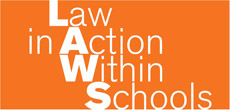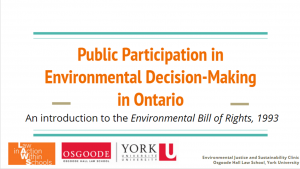Creating an environmental law workshop to encourage public participation in environmental decision-making
Access to justice is a recurring theme throughout law school. Through coursework, extracurricular activities, and Osgoode’s Public Interest Requirement, we are introduced to our role as lawyers both within and outside the courtroom and how it implicates access to justice for the clients and communities we serve. In environmental law, increasing access to justice can include encouraging community collaboration in sustainability efforts and fostering public participation in environmental decision-making. We explored these concepts in the Environmental Justice and Sustainability Clinical Intensive Program through seminars, clinical work, and student research projects.
During law school, I have been interested in how public legal education can be used as an avenue for access to justice. Public legal education can help to empower individuals and communities to become more aware of their legal rights and responsibilities and also to become agents of social change [1]. Since effective leadership in sustainability involves community collaboration and education [2], I decided to work on a public legal education project that promotes community involvement in environmental decision-making.
For my EJS research project, I co-created an environmental law workshop with Netta Untershats (JD 2017) for secondary school students in the Law in Action Within Schools (LAWS) program. The LAWS program is a partnership between the Toronto District School Board, Osgoode Hall Law School, and the University of Toronto Faculty of Law. One of the goals of the program is to “provide a positive and engaging exposure to legal issues, the justice system and the legal profession.” Developing an interactive workshop that focuses on opportunities for students to engage in environmental law fit perfectly within this mandate. The workshop specifically focuses on educating students on their participatory rights in the Environmental Bill of Rights, 1993 and encourages students to take an active role in environmental decision-making.
School Board, Osgoode Hall Law School, and the University of Toronto Faculty of Law. One of the goals of the program is to “provide a positive and engaging exposure to legal issues, the justice system and the legal profession.” Developing an interactive workshop that focuses on opportunities for students to engage in environmental law fit perfectly within this mandate. The workshop specifically focuses on educating students on their participatory rights in the Environmental Bill of Rights, 1993 and encourages students to take an active role in environmental decision-making.
To create an effective and engaging workshop, we applied the theory of public legal education and traditional pedagogy with a focus on three key elements, namely that the workshop activities are: (1) directed towards the specific needs of the community; (2) accommodate different learning styles; and (3) are written using plain language strategies.
This environmental law workshop is the first of its kind for the LAWS program and includes three interactive components. The first activity introduces the LAWS students to the environment and environmental law through the use of an interactive mind map and an Environmental Legal Bingo game to allow students to collaboratively explore legal issues related to the environment.
The second activity is a slideshow presentation on the participatory rights in the Environmental Bill of Rights, 1993 with a focus on the right to notice, the right to comment, the right to appeal, and applications for review. These four rights were selected, as opposed to others in the Environmental Bill of Rights, 1993, because of their prospective focus on public participation in environmental decision-making, rather than retroactive involvement in after-the-fact contraventions (i.e. applications for investigations, and right to sue).
The third activity is a public comment exercise, inspired by the song lyrics of Joni Mitchell’s “Big Yellow Taxi.” Students are asked to discuss the perspectives of multiple stakeholders in response to the government’s proposal to “pav[e] paradise and put up a parking lot. With a pink hotel, a boutique, and a swinging hot spot.” The objective of this activity is to show students the importance of public comments in facilitating public participation in environmental decision-making, and how the Government of Ontario considers multi-stakeholder perspectives in making environmentally significant decisions.
At the end of the workshop, students are able to: (1) identify environmental legal issues; (2) understand the relationship between civics, the environment, and the law; (3) understand their participatory rights in environmental decision-making; (4) understand the importance of multiple stakeholder perspectives and participation in environmental decision-making; and (5) understand legal tools to drive change in their communities. By educating students about environmental law, we hope to increase access to justice in our communities and encourage students to exercise their rights under the Environmental Bill of Rights, 1993. For more information about the workshop or the LAWS program, please visit www.lawinaction.ca.
References
[1] McDonald, S, “Beyond caselaw: Public legal education in Ontario legal clinics” (2000) 18 Windsor Yearbook of Access to Justice 3.
[2] Lovelace, Robert. “Notes from Prison: Protecting Algonquin Lands from Uranium Mining” in Julian Agyeman et al, eds, Speaking for Ourselves: Environmental Justice in Canada (UBC Press, 2009) ix.


